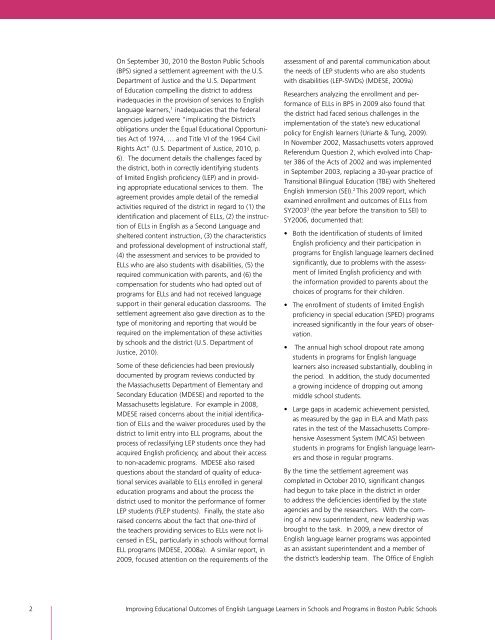Full Report - Center for Collaborative Education
Full Report - Center for Collaborative Education
Full Report - Center for Collaborative Education
Create successful ePaper yourself
Turn your PDF publications into a flip-book with our unique Google optimized e-Paper software.
On September 30, 2010 the Boston Public Schools<br />
(BPS) signed a settlement agreement with the U.S.<br />
Department of Justice and the U.S. Department<br />
of <strong>Education</strong> compelling the district to address<br />
inadequacies in the provision of services to English<br />
language learners, 1 inadequacies that the federal<br />
agencies judged were “implicating the District’s<br />
obligations under the Equal <strong>Education</strong>al Opportunities<br />
Act of 1974, … and Title VI of the 1964 Civil<br />
Rights Act” (U.S. Department of Justice, 2010, p.<br />
6). The document details the challenges faced by<br />
the district, both in correctly identifying students<br />
of limited English proficiency (LEP) and in providing<br />
appropriate educational services to them. The<br />
agreement provides ample detail of the remedial<br />
activities required of the district in regard to (1) the<br />
identification and placement of ELLs, (2) the instruction<br />
of ELLs in English as a Second Language and<br />
sheltered content instruction, (3) the characteristics<br />
and professional development of instructional staff,<br />
(4) the assessment and services to be provided to<br />
ELLs who are also students with disabilities, (5) the<br />
required communication with parents, and (6) the<br />
compensation <strong>for</strong> students who had opted out of<br />
programs <strong>for</strong> ELLs and had not received language<br />
support in their general education classrooms. The<br />
settlement agreement also gave direction as to the<br />
type of monitoring and reporting that would be<br />
required on the implementation of these activities<br />
by schools and the district (U.S. Department of<br />
Justice, 2010).<br />
Some of these deficiencies had been previously<br />
documented by program reviews conducted by<br />
the Massachusetts Department of Elementary and<br />
Secondary <strong>Education</strong> (MDESE) and reported to the<br />
Massachusetts legislature. For example in 2008,<br />
MDESE raised concerns about the initial identification<br />
of ELLs and the waiver procedures used by the<br />
district to limit entry into ELL programs, about the<br />
process of reclassifying LEP students once they had<br />
acquired English proficiency, and about their access<br />
to non-academic programs. MDESE also raised<br />
questions about the standard of quality of educational<br />
services available to ELLs enrolled in general<br />
education programs and about the process the<br />
district used to monitor the per<strong>for</strong>mance of <strong>for</strong>mer<br />
LEP students (FLEP students). Finally, the state also<br />
raised concerns about the fact that one-third of<br />
the teachers providing services to ELLs were not licensed<br />
in ESL, particularly in schools without <strong>for</strong>mal<br />
ELL programs (MDESE, 2008a). A similar report, in<br />
2009, focused attention on the requirements of the<br />
assessment of and parental communication about<br />
the needs of LEP students who are also students<br />
with disabilities (LEP-SWDs) (MDESE, 2009a)<br />
Researchers analyzing the enrollment and per<strong>for</strong>mance<br />
of ELLs in BPS in 2009 also found that<br />
the district had faced serious challenges in the<br />
implementation of the state’s new educational<br />
policy <strong>for</strong> English learners (Uriarte & Tung, 2009).<br />
In November 2002, Massachusetts voters approved<br />
Referendum Question 2, which evolved into Chapter<br />
386 of the Acts of 2002 and was implemented<br />
in September 2003, replacing a 30-year practice of<br />
Transitional Bilingual <strong>Education</strong> (TBE) with Sheltered<br />
English Immersion (SEI). 2 This 2009 report, which<br />
examined enrollment and outcomes of ELLs from<br />
SY2003 3 (the year be<strong>for</strong>e the transition to SEI) to<br />
SY2006, documented that:<br />
• Both the identification of students of limited<br />
English proficiency and their participation in<br />
programs <strong>for</strong> English language learners declined<br />
significantly, due to problems with the assessment<br />
of limited English proficiency and with<br />
the in<strong>for</strong>mation provided to parents about the<br />
choices of programs <strong>for</strong> their children.<br />
• The enrollment of students of limited English<br />
proficiency in special education (SPED) programs<br />
increased significantly in the four years of observation.<br />
• The annual high school dropout rate among<br />
students in programs <strong>for</strong> English language<br />
learners also increased substantially, doubling in<br />
the period. In addition, the study documented<br />
a growing incidence of dropping out among<br />
middle school students.<br />
• Large gaps in academic achievement persisted,<br />
as measured by the gap in ELA and Math pass<br />
rates in the test of the Massachusetts Comprehensive<br />
Assessment System (MCAS) between<br />
students in programs <strong>for</strong> English language learners<br />
and those in regular programs.<br />
By the time the settlement agreement was<br />
completed in October 2010, significant changes<br />
had begun to take place in the district in order<br />
to address the deficiencies identified by the state<br />
agencies and by the researchers. With the coming<br />
of a new superintendent, new leadership was<br />
brought to the task. In 2009, a new director of<br />
English language learner programs was appointed<br />
as an assistant superintendent and a member of<br />
the district’s leadership team. The Office of English<br />
2 Improving <strong>Education</strong>al Outcomes of English Language Learners in Schools and Programs in Boston Public Schools


